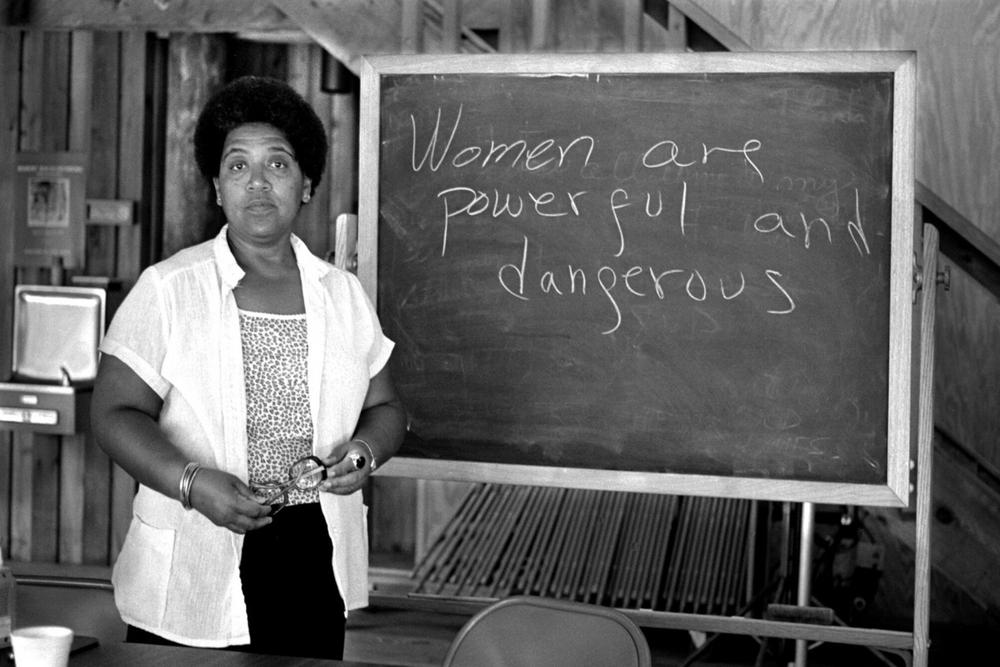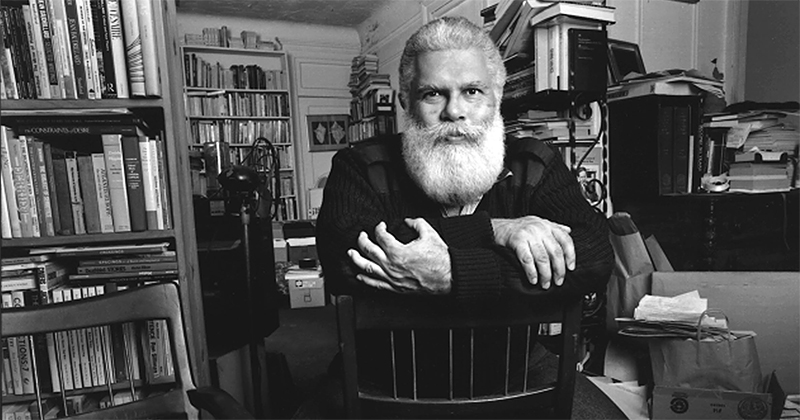“Not this” makes a difference even if it does not immediately produce a propositional otherwise. —Elizabeth Povinelli, Economies of Abandonment
Povinelli is responding to the formulation, “if not this, then what?” Especially to that demand: then what? I do not yet know how to think about this demand for replacements, especially when harmful systems and practices are involved. “Not this” does not need a replacement when “this” names harmful and unhumaning practices and institutions.
I would like to take Povinelli’s “not this” in a different direction, away from “solutions” and “alternatives” and “replacements” and “remedies,” and toward proliferation and intensification.
During a recent panel at Barnard, Ruth Wilson Gilmore said, "What the world will become already exists in fragments and pieces, in experiments and possibilities." I think she wanted to arrest how our imaginations are impeded by dominant, repressive frameworks, which describe work toward freedom as “impossible” and “unthinkable.” She wanted to arrest the paralysis created when we insist that the entire world must be remade and, in the process, void the quotidian practices that we want to multiply and intensify.
I think one possible response to “Not this” is “More that.” I come to “more that” through Audre Lorde and Samuel Delany. I love Audre Lorde’s “Uses of the Erotic: The Erotic as Power,” because of how it extends embodied sensation to life practices. A sense of self—the ego—develops through bodily sensations of pleasure and unpleasure. The ego, Freud claims, is first and foremost a bodily ego. The psyche learns how to feel from physical sensations: “it hurts” names this joint between the psychic and physical.

From Lorde, I learned about “more that.” She writes,
- "the erotic is a measure between the beginnings of our sense of self and the chaos of our strongest feelings. It is an internal sense of satisfaction to which, once we have experienced it, we know we can aspire. For having experienced the fullness of this depth of feeling and recognizing its power, in honor and self-respect we can require no less of ourselves."
“Once we have experienced” the “erotic,” that “internal sense of satisfaction,” “we can require no less of ourselves.” To return to Freud: pleasure is one of our first sensations as humans. The “erotic” is a way of naming that pleasure; it might be the language we find to describe that “internal sense of satisfaction.” “Satisfaction” is pleasure and more. I think of eating a good meal and saying, “I am satisfied.” It is how we process an experience that feeds us. Experiences that feed us can satisfy us. Satisfaction names an evaluative act: not simply “it feels good,” though “it feels good” is important. But, “it feels good” and “it satisfies.”
The erotic helps us stage a possible demand—a “more that”—in the worlds we occupy.
This internal requirement toward excellence which we learn from the erotic must not be misconstrued as demanding the impossible from ourselves nor from others. Such a demand incapacitates everyone in the process. For the erotic is not a question only of what we do; it is a question of how acutely and fully we can feel in the doing. Once we know the extent to which we are capable of feeling that sense of satisfaction and completion, we can then observe which of our various life endeavors bring us closest to that fullness.
I pause on how Lorde sequences the erotic: “what we do,” “how acutely and fully we can feel in the doing,” how we “know the extent to which we are capable of feeling,” how we “observe which of our various life endeavors bring us closest to that fullness.” Do. Feel. Know. Observe. Do. Feel. Know. Observe. Do. Feel. Know. Observe. Lorde, as I keep learning, is deeply pedagogical, deeply interested in how we learn from experience, and, especially, how doing and feeling teach us to know.
“Uses of the Erotic” is addressed to women. It dwells on feeling and satisfaction to think beyond—and against—duty and obligation. It offers the erotic as a resource every woman has available, acknowledging, in the process, that patriarchy and capitalism–Lorde named herself a socialist—starve women of resources. Patriarchy and capitalism deplete women. As scholars on Lorde note, patriarchy and capitalism depleted her: her work institution refused to accommodate requests to adjust her schedule so she could manage her cancer. Lorde is not writing from a position of triumph: she is trying to build and inhabit the worlds she describes. She is looking for available resources to cultivate “more that.”
In the spirit of “more that,” I amend Lorde’s sequence:
A pedagogy of and from the erotic. Lorde’s erotic imagines and embraces collectivity. The sharing of joy, whether physical, emotional, psychic, or intellectual, forms a bridge between the sharers which can be the basis for understanding much of what is not shared between them, and lessens the threat of their difference.Reading this teaches me how to think about online, sometimes viral, videos of cute animals and new dances. It teaches me how to think about #flowerreport and #cloudtwitter and #beautyeveryday twitter. It teaches me that sharing joy builds and sustains worlds. Sharing joy bridges geohistorical differences, makes difference less threatening. Practicing freedom, after all, is not about eliminating difference: it is always about working across difference toward freedom.
- “In touch with the erotic,” Lorde writes, “I become less willing to accept powerlessness, or those other supplied states of being which are not native to me, such as resignation, despair, self-effacement, depression, self-denial.”
One might place Lorde in conversation with African philosophy: I am because we are, and we are because of the erotic we co-create and share. What happens if we take women’s erotics—the joy, the satisfaction–as the basis of “more that”? What might become possible as a way of thinking about and creating and practicing and inhabiting freedom? What worlds become possible when women’s erotics shape our engagements, when the goal is to multiply and intensify satisfaction and joy?
In a related register, Samuel Delany writes about “pleasantness” as “more that.” Pleasantness is a way to engage the world we have while building the world we want to have. Delany opens the second essay of Times Square Red, Times Square Blue:
The primary thesis underlying my several arguments here is that, given the mode of capitalism under which we live, life is at its most rewarding, productive, and pleasant when large numbers of people understand, appreciate, and seek out interclass contact and communication conducted in a mode of good will.
I highlight pleasant because Delany returns to it, describing it as “pleasure in its most generalized form (though pleasure no less important or social for that). Another word: pleasantries. The idea of exchanging pleasantries. To make a world where pleasantries are exchanged. How exchanging pleasantries makes the social more pleasant.

As Delany maps it, pleasantness lingers where it is experienced, flavoring the air, infusing the streets, generating atmosphere. We pass by a place where we experienced pleasantness and something lifts our spirits for a moment. A faint smile might emerge.
We know the opposite too well, about how spaces where we encounter violation become uninhabitable, even, and perhaps especially, when we are forced to inhabit them. We know violation poisons the air, blights the atmosphere, makes the ground unwalkable, our breathing suffocated.
Yet, we also know that experiences of the pleasant generate different geographies and geohistories, and place-feelings. We carry these place-feelings with us. We return to those geographies and geohistories to experience those historical feelings and to multiply and intensify them. Pleasantness, which we create in our interactions with others, invites us to keep generating more pleasantness. We return to spaces that generate pleasantness. We circulate pleasantness in those spaces. It might be a kiosk. It might be a bar. It might be a public park. It might be a coffee shop. It might be a library. It might be a place of worship. It might be a favorite matatu. It might be the shift of a particular person at a place you frequent.
Pleasantness is not a remedy. It is not even a demand. I think of it as an atmosphere created by quotidian interactions and actions. If the erotic moves out from the self, pleasantness requires sociality. One exchanges pleasantries.
Part of my attachment to Through the Valley of the Nest of Spiders is because it models pleasantness. For instance, Off in the brush, Eric heard Uncle Tom moving—whose interests were food, sex, rubs, and hugs, with all of which Eric figured, they were pretty generous. I think of what it means to be generous with “food, sex, rubs, and hugs,” the kind of possibilities that creates. When Eric’s long-term lover Shit dies, Eric muses, Tomorrow, I got to make some food and take it to the market, to give away. Because otherwise I’ll die of grief.
To extend oneself into the world, to “give away,” to be generous, to generate pleasantness as a way to live with grief. Not to get over grief. This is not about remedy. But as a way to live with grief. I am arrested, here, because I wonder what it means to generate pleasantness, through generosity, as a way to live with grief. And, perhaps, because I want to insist that pleasantness is not about the absence of pain or loss or grief or tragedy. It is the interactions we create, the “more that,” that make the quotidian more livable, more possible.
If the erotic names a kind of intensity that flavors the social, helping to make it more desirable and possible, helping to make difference less threatening, the pleasant might name the quotidian hum, a lubricant that keeps the social sustainable. If the erotic is a demand placed on the self and its endeavors that then extends out to all relations, the pleasant might name habitual interactions, practices that make social spaces more shareable. It might be that the pleasant builds into an intensity called the erotic and it might be that the erotic diffuses into a quotidian called pleasantness, and it might be the weaving of the erotic and the pleasant that names a present quotidian that extends into a desired future, a “more that” we claim and practice.